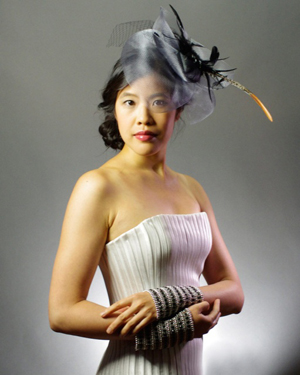New World chamber program artfully mixes 20th- and 21st-century voices

Cynthia Lee Wong’s “Snapshots” received its world premiere Sunday in the New World Symphony’s chamber music concert.
While breezy weather was the main draw Sunday afternoon in Miami Beach, the “New Voices” program in the New World Symphony’s chamber music series provided its own appealing charms.
An interesting fragment by Arnold Schoenberg led the program. A Rendezvous, based on a poem by Richard Dehmel, bears the hallmarks of Schoenberg’s transitional period from post-Romantic to 12-tone composer. With the poem projected above the ensemble, the work’s motives developed into long, continuously varied lines over sustained accompaniments. Mournfully rendered solos by oboist Henry Ward and clarinetist David Lemelin above an exquisitely balanced ensemble of violin, cello and piano perfectly captured the misty, occult evocation of a dead lover.
This past summer ascending American composer Cynthia Lee Wong was selected to participate in the “New Voices” program, the collaborative project between Boosey & Hawkes, the New World Symphony, and the San Francisco Symphony. Wong will be represented by two commissioned compositions: a work for orchestra that will be played by the New World Symphony in April and her chamber work, Snapshots, which had its world premiere on Sunday.
Wong’s intent in Snapshots is to capture the feeling of fast-paced modern urban life, which was evident in the piano quintet and percussion duo’s incisive lines and racing notes.
Snapshots received a polished premiere under Michael Linville’s baton. With utmost precision, the ensemble’s transparent texture revealed Wong’s substantial multitude of ideas. A recurring slower melody highlighted cellist Marybeth Brown-Plambeck’s formidable musicality, and feathery duos between the piano and quartet were captivating. Keyboard percussion provided the edge, along with admirable time-keeping by pianist Aya Yamamoto.
The program’s warhorse, Stravinsky’s Octet for winds and brass, received a mostly brilliant rendition. Unfortunately, by its instrumentation the ensemble doesn’t blend, making missed attacks audible. Spirited execution ultimately did justice to the work’s angular lines and peppy rhythms. Standout moments spotlighted duos: a sublimely unified melody in octaves by flutist Henrik Heide and clarinetist Brad Whitfield; bassoon duo Thomas Fleming and Kathryn Brooks trading runs like a single instrument; and the reliably musical trombonist Kathryn Daugherty, paired with bass trombonist Jeremy Morrow, contributing strong, visceral lines.
Dan Welcher’s Museon Polemos, while well-crafted, proved far less original than Wong’s Snapshots. Museon pitted a NWS string quartet against guest ensemble, the Miró Quartet, as Tribes A and B, respectively, in a “proto-ballet for 8 dancers.” Programming this work after the Octet brought into relief how visionary Stravinsky was in his time, and how many composers today are still trying to catch up.
Although initially claiming in the program notes that the work is “completely abstract”, the notes that follow and Welcher’s own pre-performance comments described at length the competition to ensue between the quartets. Claiming Stravinsky’s ballets of the 30s and 40s as inspiration, Museon’s core idea of rival tribes, and much of the actual music, is lifted from The Rite of Spring.
As the Apollonian tribe, the NWS quartet delivered delicate tonal textures and clarity, with elegant fluidity. As the more aggressive, Dionysian tribe, Miró brought muscularity (and some mugging) to the rhythmically driven ideas. The star-turn violin solo in the second movement, played by Miró’s Daniel Ching, devolved into an unfortunate theft of Stravinsky’s “Les Augures printaniers/Danses des adolescentes,” which also dominated the third movement. Many violin chops later, a major-key epilogue allowed the audience to express great enthusiasm for the work. They would probably enjoy Stravinsky’s original even more.
Posted in Performances
Leave a Comment
Mon Nov 4, 2013
at 12:05 pm
No Comments




